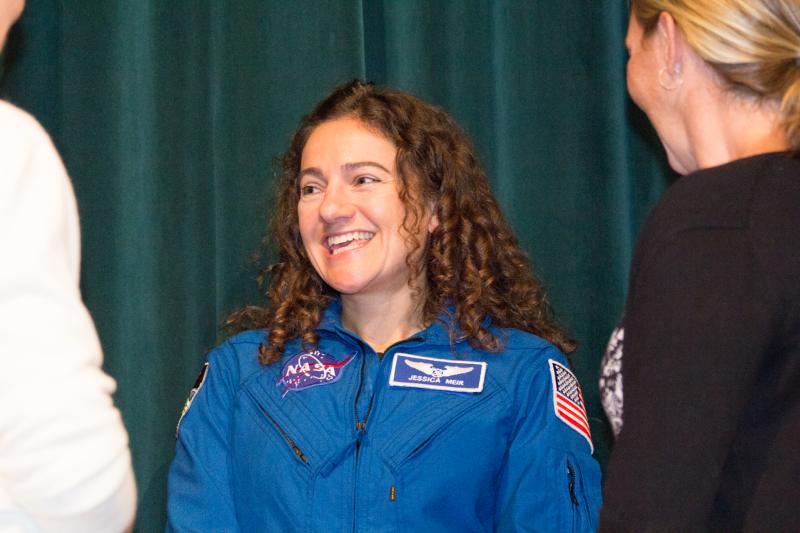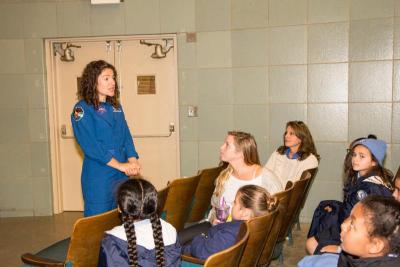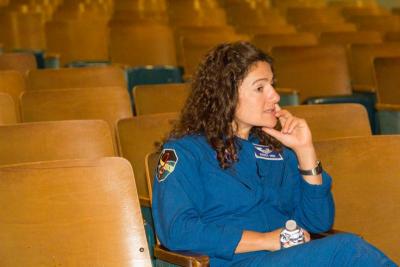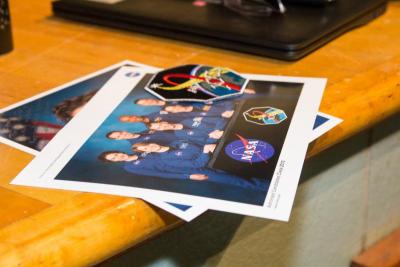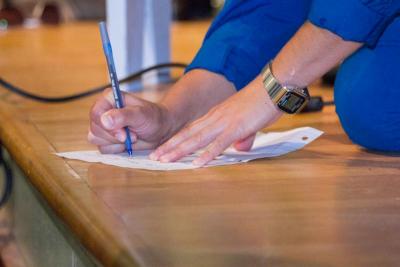NASA astronaut encourages students to reach for the stars
Being an astronaut requires more than a strong command of math and science. On occasion, while circling around the planet in low-Earth orbit, astronauts need to know how to repair a toilet.
“Sometimes, you’re not a scientist,” said NASA astronaut Jessica Meir, 38. “You’re an electrician or a plumber. Whatever needs to be done that day.”
Meir visited Dartmouth Middle School on Oct. 20 to speak with students about her journey from being a 5-year-old with a dream of exploring space to an astronaut with her eyes set on visiting the International Space Station. The Women in Aviation Atlantic Aviators Chapter brought Meir to the area to speak with students.
Meir didn’t hide the truth from her young audience: becoming an astronaut is a long shot.
Meir, a native of Caribou, Maine, graduated from Brown University in 1999 with a bachelor's in biology and went on to earn her Master of Science degree in space studies from the International Space University in 2000. She earned a doctorate in marine biology from Scripps Institution of Oceanography.
But even with her robust resume, Meir was initially turned down in 2009 when NASA was selecting a group of eligible candidates to put through astronaut training. When she applied again to be part of NASA Astronaut Group 21, she was up against more than 6,300 other applicants.
Only eight were selected to join the new batch of recruits. Meir was one of them.
“Luckily, a lot of the things I was interested in were things that looked good on my resume, like being a private pilot, scuba diving – particularly the type of scuba diving I did in the Antarctic,” she said. “That showed that I was not only a scientist, I also had an operational skill set, which is really important at NASA.”
About 13 years ago, Meir worked at NASA on what’s called a NEEMO mission, or NASA Extreme Environment Mission Operations. The research mission involved a five-day stay at Aquarius, the underwater base in Key Largo. She said extended diving missions provide a great analogue for life in a space environment.
It’s also a great team builder.
“We call them ‘expeditionary skills’ – developing team care and group living scenarios, which are all important to master before going into space,” she said.
In August 2013, the members of NASA Astronaut Group 21 began training in Houston, Texas. The group graduated to become official astronauts this past July and can now accept spaceflight assignments.
However, once training is complete, astronauts don’t immediately hop on a rocket and blast off into space.
“The only existing mission right now is the International Space Station,” she said. “Since we’re only launching a few Americans per year, it will be a couple years for us. I would say the people in my class will start flying three to five years from now. Hopefully, we’ll all get missions on the space station.”
In the meantime, she and her graduating class are all in various “ground jobs.” Meir works as a capsule communicator, the person in the mission control room that speaks to astronauts. She’s also expected to maintain proficiency in all other aspects of her training, including flight training, spacewalk training, and speaking Russian.
“One of the other big things we do is space station systems training,” said Meir. “We have to learn all the aspects of the space station, from the electrical system, the power system, the thermal control system, the environmental control system so that we know how to operate it while we’re there, but also know how to fix it.”
She said that during the days of the Space Shuttle, which ended in 2011, crews would be comprised of pilot astronauts, scientists or missions specialists. But now, because there are only six astronauts on the International Space Station at a time, every astronaut has to be a Jack of all trades.
At a time when unmanned space exploration has led to crystal clear images of Pluto and the discovery of water on Mars, Meir said that astronauts are sometimes misunderstood.
“A lot of people that we meet will say, ‘Why did NASA pick new astronauts? Didn’t they close?’ The space shuttle retired and people thought that was it,” said Meir. “We have a very active space program.”
She said that’s why it’s important for assemblies like the one held at the middle school so that people can see the result of where their tax dollars are going as well as the accomplishments and scientific results of that investment.
She said studying space has the added benefit of helping humans better understand our own slice of the solar system.
“People take for granted that they’re reliant on space for so many things,” she said. “Kids that grow up with cell phones and the Internet don’t think about the importance of satellites. They’re relying on space for everything that they’re using on a daily basis.”
For updates on Meir’s adventures at NASA, follow her on Twitter at @Astro_Jessica.



